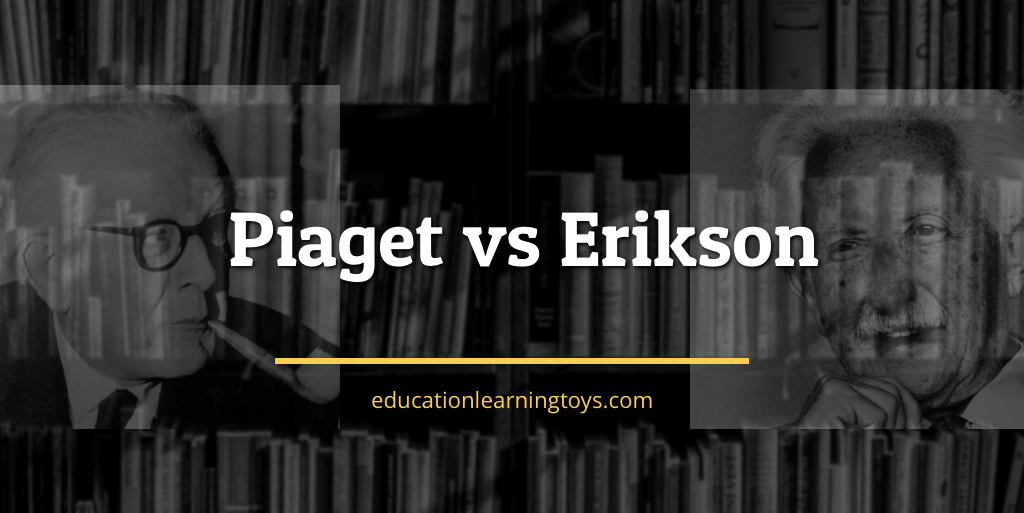Since the 20th century, understandings of childhood development have gone through many changes. There have many influential thinkers and psychologists who have developed theories to help us understand how a child’s brain thinks and processes the world. These theories have been informed by observation, social context, and historical relevance.
Two thinkers who made significant contributions to this area were Jean Piaget and Erik Erikson. They both studied various elements of child behavior, actions, and thought processes.
Throughout this article, we will have a closer look at the two theories they established and how they compare and contrast with one another and other childhood psychologists’ thoughts.

Piaget’s theory of development
Jean Piaget developed a theory that related to the various stages of childhood when a child transitions through cognitive developmental phases. His key point is that cognitive development is like stepping stones, where one milestone informs the next.
Piaget argued that these phases were influenced by external forces. For instance, the mental structure of a child was fluid and changing, depending on what was going on in their environment as they learned something new.
The stages of development are based on age and ability but they must be passed through sequentially. The four stages include:
- Sensorimotor stage from infancy to 2 years old
- Preoperational period from 2 to 7 years old
- Concrete stage from 7 to 11 years old
- Formal operational stage from 11 years old to adulthood
Erikson’s theory of development
Years after Piaget, Erik Erikson developed a child psychology theory. He also dealt with development in stages. These stages were thought of as life hurdles. Each hurdle and how it was overcome influenced how a child would progress to the next stage of their life.
Some of the hurdles and stages that Erikson considered were:
- Trust vs mistrust
- Autonomy vs doubt
- Initiative vs guilt
- Industry vs inferiority
- Identity vs confusion
- Intimacy vs isolation
- Generativity vs stagnation
- Integrity vs despair
These stages are dependant on ages. Thus, trust vs mistrust is the first hurdle that children face in life, between the early ages of birth to one year old. In this stage, they are completely dependent on their caregiver, so how they trust or don’t trust is crucial to developing a sense of ease and security in the world.
This then shapes how the child will respond to next hurdle of autonomy vs shame or doubt when they are aged between 1-3. This is when they develop life skills and identity to help inform the next stage. Each step continues to be informed by the former, helping children to develop their identity, sense of belonging, and finding their purpose in life.

Differences between Piaget and Erikson
The key difference between Piaget and Erikson is that Erikson created an understanding of development throughout the whole life, while Piaget focused just from infancy to the late teenage years. Erikson felt that each life event impacted on the next one and the success of progressing through life was dependent on a prior challenge. Alternatively, Piaget examined the thought process of the child and how their brain responded to the environmental factors around them, rather than just crises.
While Piaget focused on cognitive development, Erikson’s thoughts were more focused on emotional development. They also differ in how they view the fundamental life stages. Piaget believes that experiences determine the stages of development while Erikson uses all the stages upto the elderly years as essential in explaining the stages of development.
Similarities between Piaget and Erikson
Evidently, both Piaget and Erikson recognized that children develop through stages and milestones. The process is sequential according to both their theories. Also, there are challenges that each stage has waiting for children. The way that these challenges impacts on the development is what sets them apart.
There is also the similarity that personality develops over a lifespan. Piaget and Erikson both determined that it is nurture that develops the personality, rather than nature. This is because they believe personality is shaped by environmental, social, and familial circumstances. These two theories promote the idea that children get inspired from their surroundings during the learning process.
Piaget and Erikson VS other theorists
Along with their own theories, Piaget and Erikson are often studied in relation, comparison, and contrast to other famous childhood psychologists. For instance, some other well known names that appear in this field are Freud and Vygotsky.
Piaget and Vygotsky are often compared and contrasted in the ‘nature vs nurture’ debate. While Piaget studied the mental structure of the brain and cognitive development as a fixed thing, Vygotsky claimed that the environmental and social forces around a child were what determined how the brain would develop and grow.
Erikson’s theories are more in line with Freud as he drew inspiration from the famous psychologist. Freud’s critical theory is that environmental influences determine an individual’s personality. Erikson drew further on this by recognizing the importance of self autonomy vs shame and doubt.

Conclusion
Both Piaget and Erikson have theories that have a profound impact on how we understand child development. It is important to recognize the significance they both have in the way we understand how children grow and develop in both a cognitive and emotional sense. However, not one theory is right or wrong.
The works, theories, and expressions of Piaget and Erikson are highly useful in informing pedagogical method. Using both ideas to inform how best to teach, lead, and educate children is the best way to get a holistic view of childhood development. Taking into account that the cognitive and emotional development can be influenced by many factors and there are many stages that take place, Piaget and Erikson have highly useful and important findings.




